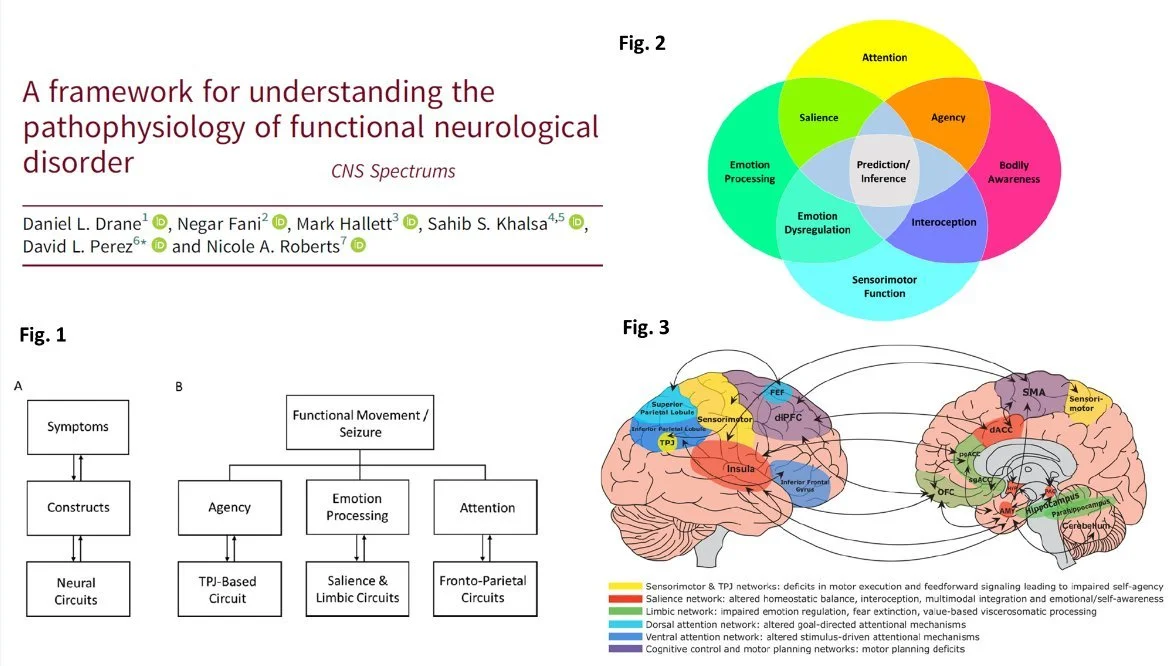Better understanding Functional Neurological Disorder and how therapy can help
FND simple analogy: “the hardware itself is not damaged, but there is a problem with the software and so the computer doesn't work properly”
Functional Neurological Disorder (FND) is a complex and often misunderstood condition that lies at the intersection of neurology and psychiatry. Characterised by neurological symptoms that cannot be explained by traditional organic brain disease, FND encompasses a variety of symptoms including motor dysfunction, seizures that are not caused by epilepsy (non-epileptic seizures), sensory deficits, and cognitive disturbances.
Epidemiology of FND
FND is relatively prevalent, with estimates suggesting it accounts for approximately 6% of patients seen in neurology clinics. Despite its frequency, the disorder often goes misdiagnosed or misunderstood. Research indicates that FND is the second most common reason for neurological consultation, following only after headaches/migraines.
Pathophysiology and Diagnosis
The exact mechanisms underlying FND remain unclear, but it is believed to involve complex interactions between neurological, psychological, and environmental factors. The diagnosis of FND is primarily clinical and is based on the observation of specific physical signs and symptoms that are inconsistent with recognised neurological or medical conditions. Modern diagnostic protocols emphasize the presence of positive signs that are typical of FND, rather than merely ruling out other disorders.
Recent research out of Cambridge university. Fig 1. A) Illustration of the relationship between symptoms, constructs and neural circuits underlying functional neurological disorder (FND). Symptoms can be understood as mapping onto alterations of different constructs, which are generated by neural circuit abnormalities. B) Examples of how different symptoms or observable manifestations of FND can be understood as arising from one or a combination of specific abnormal constructs. For example, paroxysmal movements can be perceived as involuntary by an individual with FND due to a dysfunction of the construct of agency, which is driven by abnormalities of a TPJ-based circuit. TPJ indicates temporo-parietal junction. Fig 2. Abnormalities of several constructs (and their associated neural circuits) can interact in different ways to produce symptoms and observable signs of functional neurological disorder. Fig 3. Display of brain circuits (and related constructs) that are emerging as https://doi.org/10.1017/S1092852920001789 important in the pathophysiology of functional neurological disorder (FND).
Role of Physiotherapists and Exercise Physiologists in Managing FND under the NDIS
The National Disability Insurance Scheme (NDIS) and FND
In Australia, individuals with FND may receive support through the National Disability Insurance Scheme (NDIS), which recognizes the substantial impact this disorder can have on a person’s function and quality of life. The NDIS provides funding for supports and services including therapies from physiotherapists and exercise physiologists, which are crucial in the management of FND.
Contribution of Physiotherapists
Physiotherapists play a vital role in the treatment of FND. They help patients manage and improve motor symptoms such as weakness, gait abnormalities, and movement disorders. The physiotherapeutic approach typically involves:
Education on symptom management.
Tailored exercise programs that promote motor relearning.
Techniques to manage pain and improve mobility.
These interventions are aimed at retraining the brain to control the body’s movements effectively, potentially leading to significant improvements in daily functioning.
Contribution of Exercise Physiologists
Exercise physiologists also contribute significantly to the care of individuals with FND under the NDIS. Their expertise in exercise science allows them to design personalized exercise programs that address not just physical health, but also psychological aspects which are often intertwined with FND symptoms. Key benefits provided by exercise physiologists include:
Improved overall physical fitness and stamina, which can counteract fatigue and enhance energy levels.
Stress and anxiety reduction through structured physical activity.
Enhanced endorphin release, which can improve mood and cognitive function.
Evidence-Based Benefits
Studies have shown that targeted physical therapies can lead to measurable improvements in FND symptoms. For instance, a controlled trial might reveal that participants receiving regular, tailored physical therapy sessions experience a 30% improvement in motor function and a 25% reduction in pain symptoms, compared to those who do not receive these interventions.
FND is a challenging and multifaceted disorder that necessitates a comprehensive treatment approach. In Australia, the NDIS provides crucial support for individuals with FND, enabling access to physiotherapists and exercise physiologists. These professionals are essential in helping individuals manage their symptoms, improve their physical health, and ultimately enhance their quality of life. Through continued research and clinical practice, the contributions of these therapies are becoming increasingly validated, offering hope and functional improvement to those affected by FND.
For more information and support from our experienced Allied health team, CONTACT US to learn more and make a booking to start working on your goals. You can also read more about our other Neurohub solutions here.

